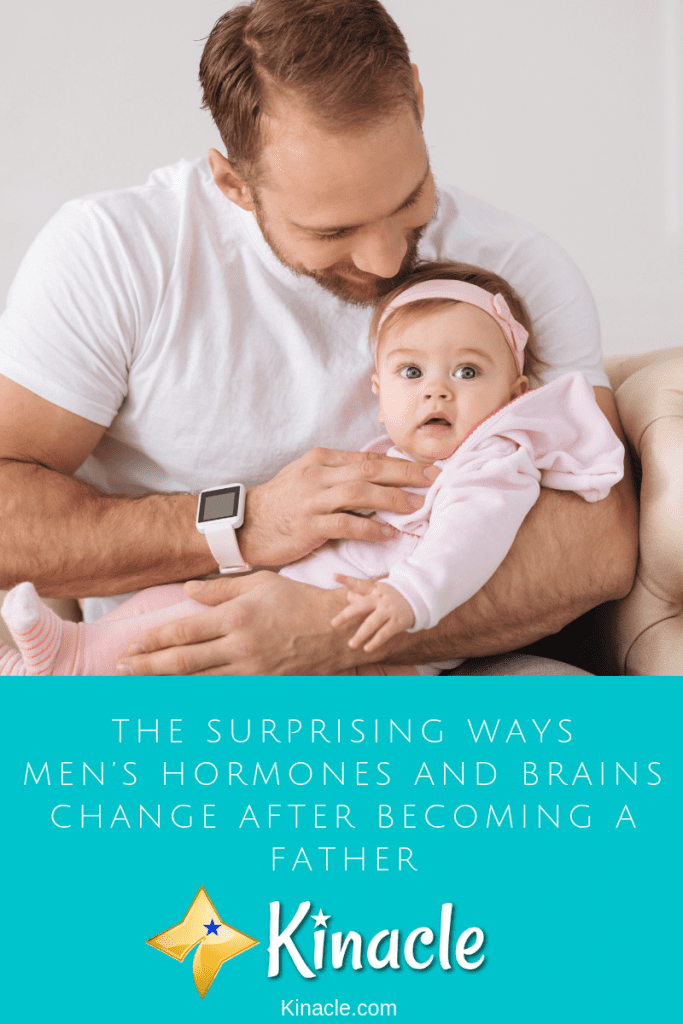
The hormonal changes women go through during pregnancy and after the birth are well documented. However, did you know men also go through hormonal changes when they become a father?
While it isn’t widely talked about, men’s brains do go through a few changes both when they learn they are expecting a child and after the birth. Several studies have been conducted to establish how men’s hormones change and why. Here, we’ll look at some of the surprising ways men’s hormones and brains change after becoming a father according to research so far.
A Reduction In Testosterone
A longitudinal study carried out in 2011, revealed men’s testosterone levels can drop as much as 40% after baby is born. The theory behind this is that a reduction in testosterone decreases aggression and makes it easier for dad to bond with their new baby.
Interestingly, animals tend to have the opposite response. In rodent studies, it’s been discovered that testosterone levels actually increase after the birth. This is thought to be a protective instinct which human males don’t really need in this day and age.
An Increase In Female Hormones
It’s not just the male hormones which change, men also experience an increase in female hormones such as estrogen, progesterone and estradiol.
It is thought that the estrogen levels increase to enhance the caregiving and nurturing side in males, helping them to bond with their new child. Progesterone is also associated with social closeness, as well as maternal behavior, while estradiol further helps with bonding and caregiving.
It’s worth noting here that some studies have actually shown estradiol levels can decrease in men after the birth. So, there are conflicting findings out there, making it difficult to know 100% whether hormonal changes in men are linked to becoming a father or not. What is known, is that spending time with the mother and baby after the birth seems to kick start the hormonal changes in the father.
The Oxytocin Connection
Studies have shown that dads who spend more time with their children, tend to have a higher level of oxytocin within the body. This hormone appears to increase the childcare instinct, and it also makes babies more responsive to their dads during play sessions too.
However, the hormone is known to have numerous effects on the body and not all of them are overly positive.
The Development Of New Neurons
One of the most surprising findings when looking at how men’s brains change after the birth, is that a large number of new neurons appear to develop. However, this has only been proven through animal, rather than human studies.
The new neurons discovered through the animal studies were found to link to enhanced recognition, navigation and memory.
Developing The Same Parenting Networks As The Mother
As the father looks after the child, their brain starts to look a lot like the mother’s. Through caring for their children, there is an activation of the networks within the brain linked to social understanding and emotional processing. Fathers who are the primary caregiver for their children show the same brain network as mothers who are the primary caregiver.
This could suggest that the brain adapts to its childcare responsibilities, regardless of gender. However, further research will need to be carried out due to how conflicting current results are.
Conclusion
As it stands, very little is known about the full extent of hormonal changes men experience after becoming a father. The conflicting studies, and lack of human studies, also make it difficult to predict accurate hormonal changes. However, it is clear that some changes do take place. This provides an interesting look into how humans, regardless of gender, adapt to raise their young.
So, if you notice a change in behavior after the birth, it’s not a coincidence; it’s more than likely down to a change in hormones.
Leave a Reply